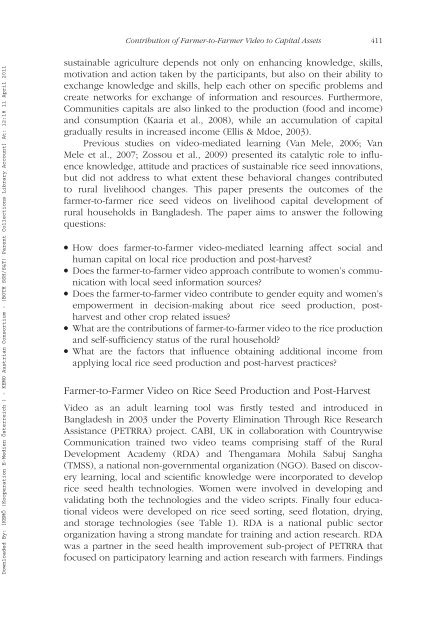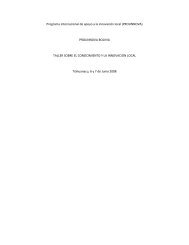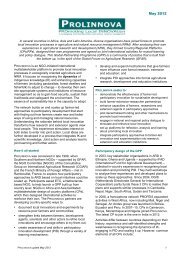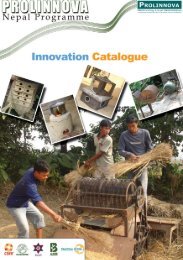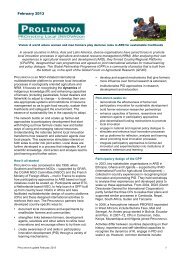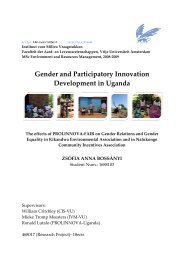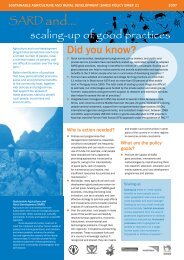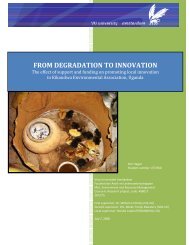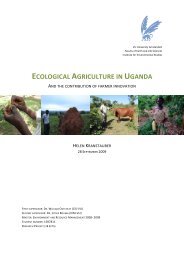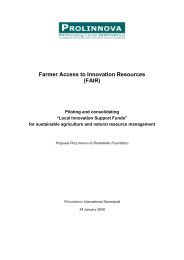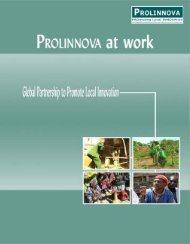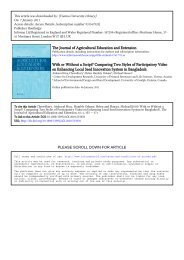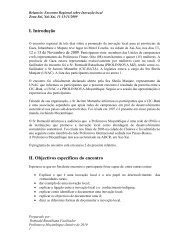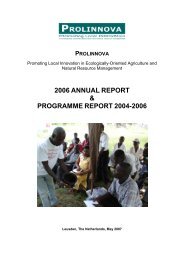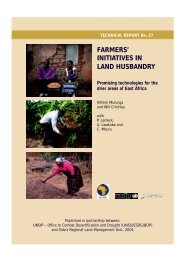Chowdhury et al (2011); PDF file - Prolinnova
Chowdhury et al (2011); PDF file - Prolinnova
Chowdhury et al (2011); PDF file - Prolinnova
You also want an ePaper? Increase the reach of your titles
YUMPU automatically turns print PDFs into web optimized ePapers that Google loves.
Contribution of Farmer-to-Farmer Video to Capit<strong>al</strong> Ass<strong>et</strong>s 411<br />
Downloaded By: [KEMÖ (Kooperation E-Medien Österreich ) - KEMO Austrian Consortium - (BOTH SSH/S&T) Parent Collections Library Account] At: 12:18 11 April <strong>2011</strong><br />
sustainable agriculture depends not only on enhancing knowledge, skills,<br />
motivation and action taken by the participants, but <strong>al</strong>so on their ability to<br />
exchange knowledge and skills, help each other on specific problems and<br />
create n<strong>et</strong>works for exchange of information and resources. Furthermore,<br />
Communities capit<strong>al</strong>s are <strong>al</strong>so linked to the production (food and income)<br />
and consumption (Kaaria <strong>et</strong> <strong>al</strong>., 2008), while an accumulation of capit<strong>al</strong><br />
gradu<strong>al</strong>ly results in increased income (Ellis & Mdoe, 2003).<br />
Previous studies on video-mediated learning (Van Mele, 2006; Van<br />
Mele <strong>et</strong> <strong>al</strong>., 2007; Zossou <strong>et</strong> <strong>al</strong>., 2009) presented its cat<strong>al</strong>ytic role to influence<br />
knowledge, attitude and practices of sustainable rice seed innovations,<br />
but did not address to what extent these behavior<strong>al</strong> changes contributed<br />
to rur<strong>al</strong> livelihood changes. This paper presents the outcomes of the<br />
farmer-to-farmer rice seed videos on livelihood capit<strong>al</strong> development of<br />
rur<strong>al</strong> households in Bangladesh. The paper aims to answer the following<br />
questions:<br />
●<br />
●<br />
●<br />
●<br />
●<br />
How does farmer-to-farmer video-mediated learning affect soci<strong>al</strong> and<br />
human capit<strong>al</strong> on loc<strong>al</strong> rice production and post-harvest?<br />
Does the farmer-to-farmer video approach contribute to women’s communication<br />
with loc<strong>al</strong> seed information sources?<br />
Does the farmer-to-farmer video contribute to gender equity and women’s<br />
empowerment in decision-making about rice seed production, postharvest<br />
and other crop related issues?<br />
What are the contributions of farmer-to-farmer video to the rice production<br />
and self-sufficiency status of the rur<strong>al</strong> household?<br />
What are the factors that influence obtaining addition<strong>al</strong> income from<br />
applying loc<strong>al</strong> rice seed production and post-harvest practices?<br />
Farmer-to-Farmer Video on Rice Seed Production and Post-Harvest<br />
Video as an adult learning tool was firstly tested and introduced in<br />
Bangladesh in 2003 under the Poverty Elimination Through Rice Research<br />
Assistance (PETRRA) project. CABI, UK in collaboration with Countrywise<br />
Communication trained two video teams comprising staff of the Rur<strong>al</strong><br />
Development Academy (RDA) and Thengamara Mohila Sabuj Sangha<br />
(TMSS), a nation<strong>al</strong> non-government<strong>al</strong> organization (NGO). Based on discovery<br />
learning, loc<strong>al</strong> and scientific knowledge were incorporated to develop<br />
rice seed he<strong>al</strong>th technologies. Women were involved in developing and<br />
v<strong>al</strong>idating both the technologies and the video scripts. Fin<strong>al</strong>ly four education<strong>al</strong><br />
videos were developed on rice seed sorting, seed flotation, drying,<br />
and storage technologies (see Table 1). RDA is a nation<strong>al</strong> public sector<br />
organization having a strong mandate for training and action research. RDA<br />
was a partner in the seed he<strong>al</strong>th improvement sub-project of PETRRA that<br />
focused on participatory learning and action research with farmers. Findings


